Analysis of London Tourism: Stakeholders, Economics, and Globalization
VerifiedAdded on 2023/01/05
|12
|4050
|78
Report
AI Summary
This report delves into the London tourism industry, highlighting its importance to the business environment and the roles of key stakeholders such as the government, tour operators, tourists, and employees. It examines the economic dimensions of tourism in London, including its impact as an economic force, the multiplier effect on various sectors, and its role as an employment generator. The report also explores the motivations of London tourists, the evolution of demand, and the influence of globalization on the tourism industry, with a focus on how companies like TUI UK contribute to the tourist experience. The study covers the allure of London's heritage, popular tourist destinations, transportation links, security, and social interaction, as well as the impact of pre-visit promotions, visitor experiences, events, and amenities on tourist satisfaction. Finally, the report looks at how globalization affects tourism destinations and the strategies employed to enhance the overall experience of visitors.
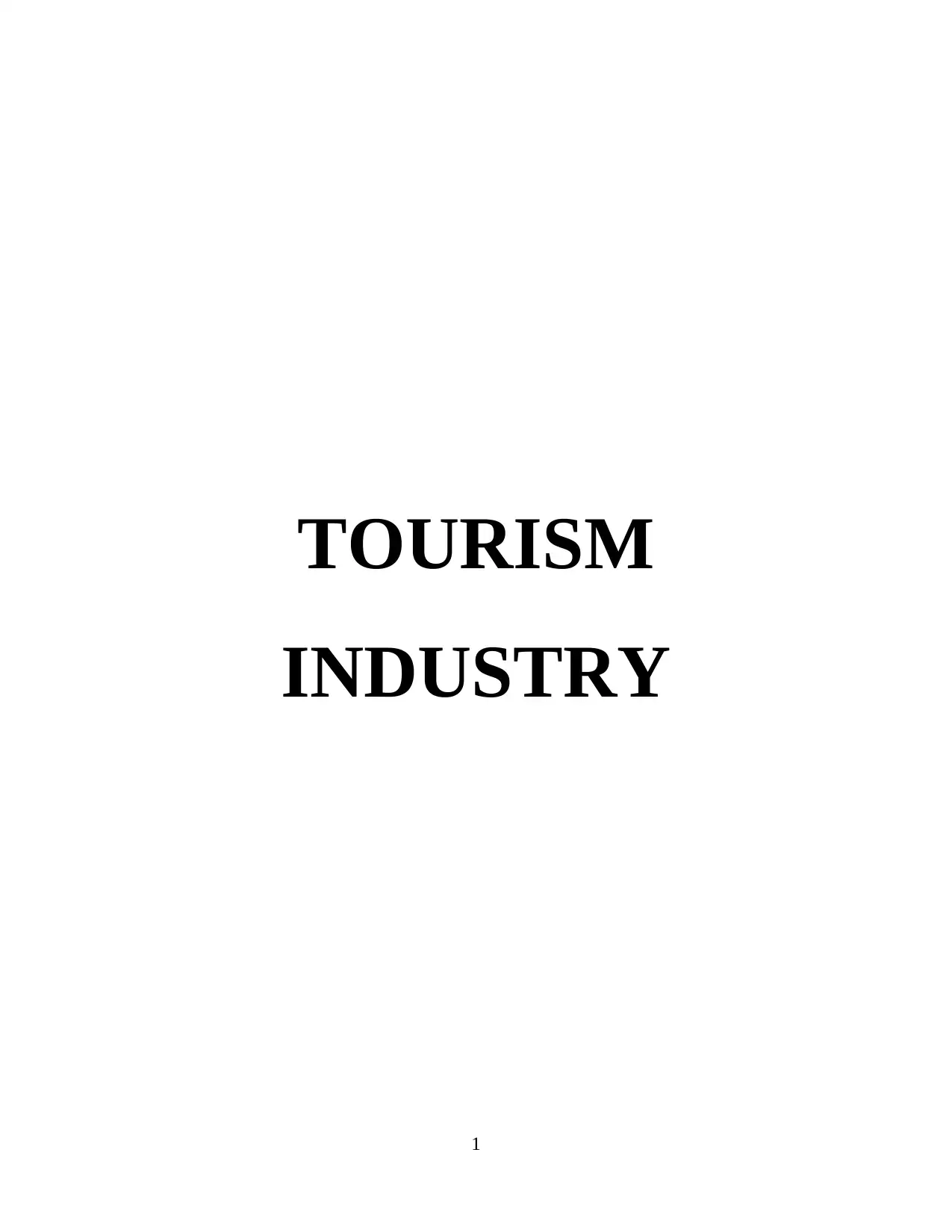
TOURISM
INDUSTRY
1
INDUSTRY
1
Paraphrase This Document
Need a fresh take? Get an instant paraphrase of this document with our AI Paraphraser
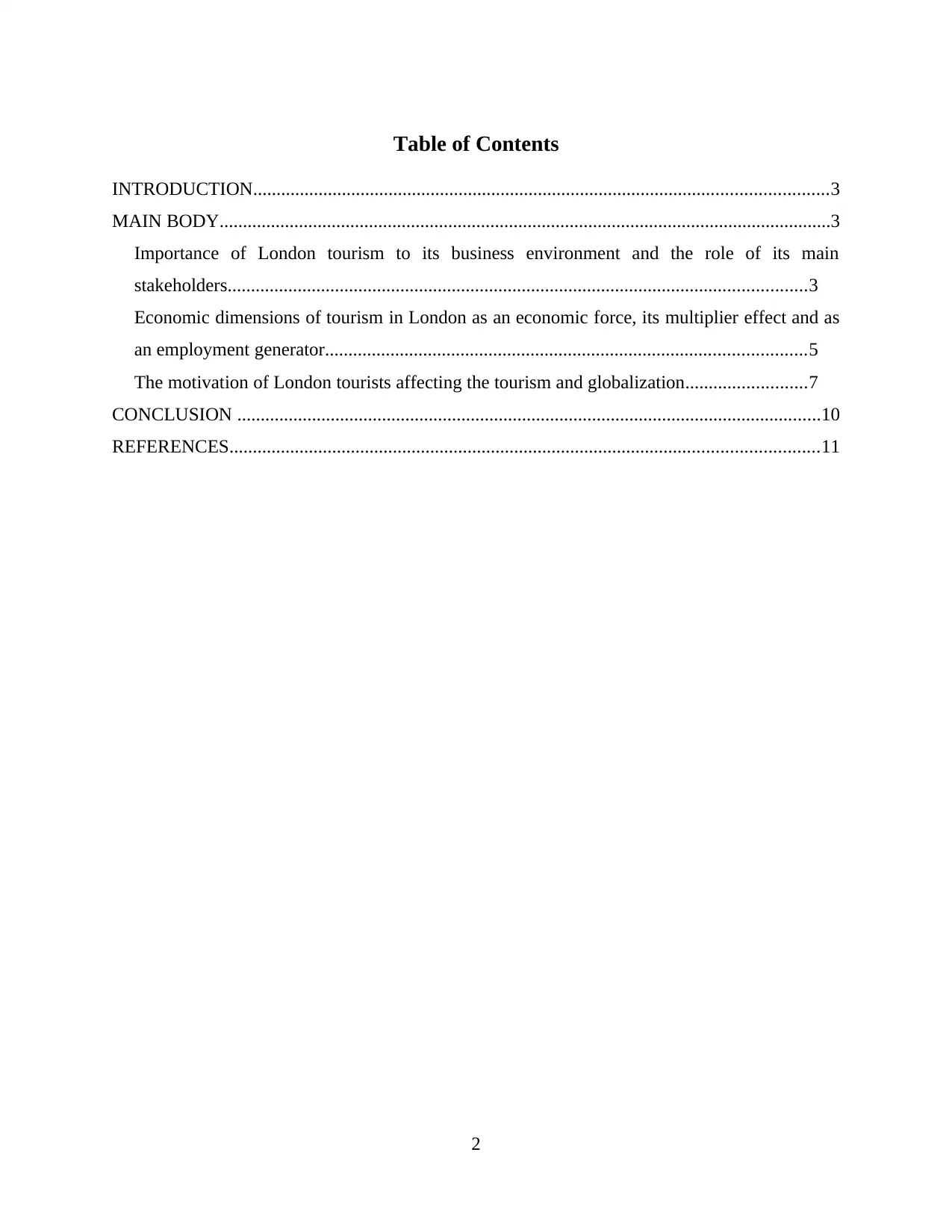
Table of Contents
INTRODUCTION...........................................................................................................................3
MAIN BODY...................................................................................................................................3
Importance of London tourism to its business environment and the role of its main
stakeholders............................................................................................................................3
Economic dimensions of tourism in London as an economic force, its multiplier effect and as
an employment generator.......................................................................................................5
The motivation of London tourists affecting the tourism and globalization..........................7
CONCLUSION .............................................................................................................................10
REFERENCES..............................................................................................................................11
2
INTRODUCTION...........................................................................................................................3
MAIN BODY...................................................................................................................................3
Importance of London tourism to its business environment and the role of its main
stakeholders............................................................................................................................3
Economic dimensions of tourism in London as an economic force, its multiplier effect and as
an employment generator.......................................................................................................5
The motivation of London tourists affecting the tourism and globalization..........................7
CONCLUSION .............................................................................................................................10
REFERENCES..............................................................................................................................11
2
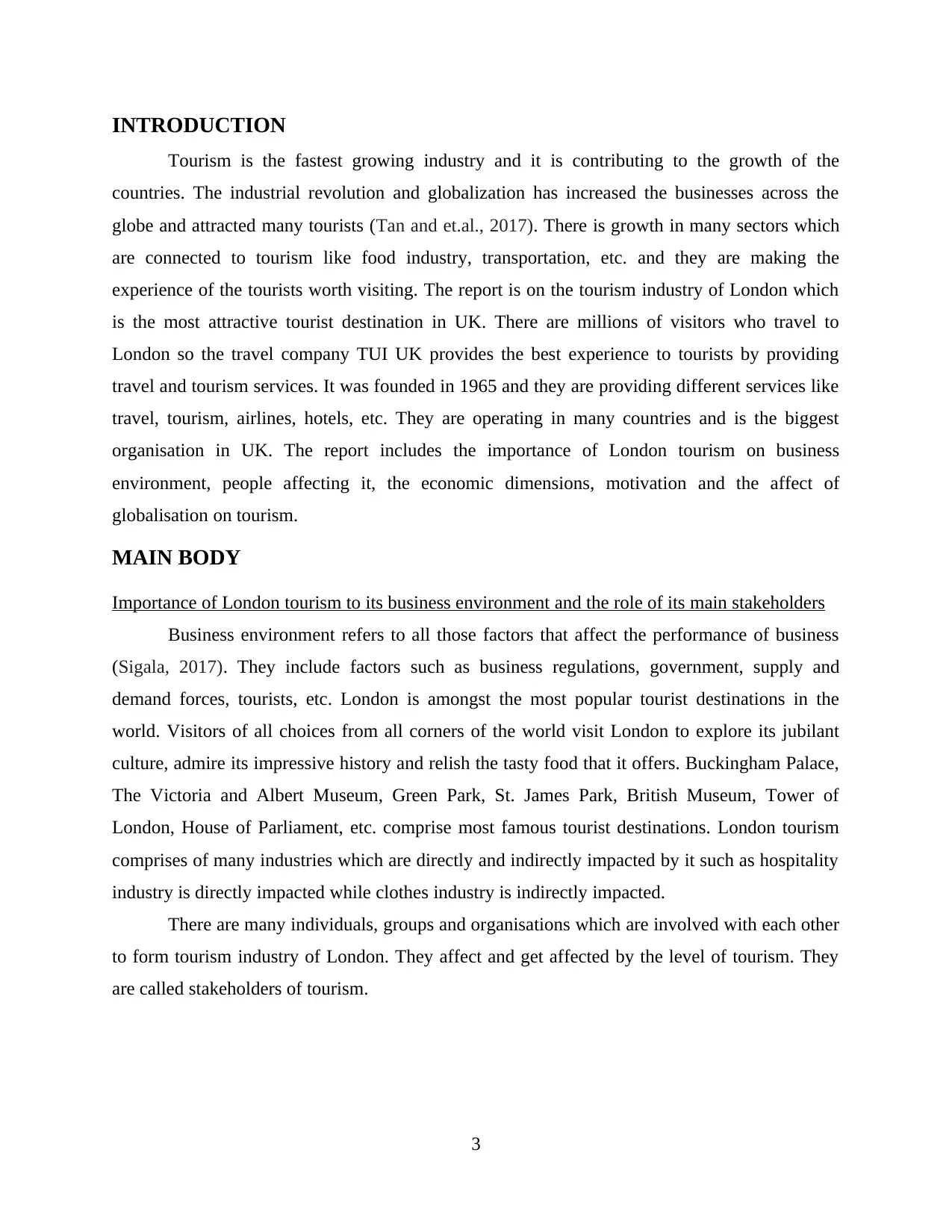
INTRODUCTION
Tourism is the fastest growing industry and it is contributing to the growth of the
countries. The industrial revolution and globalization has increased the businesses across the
globe and attracted many tourists (Tan and et.al., 2017). There is growth in many sectors which
are connected to tourism like food industry, transportation, etc. and they are making the
experience of the tourists worth visiting. The report is on the tourism industry of London which
is the most attractive tourist destination in UK. There are millions of visitors who travel to
London so the travel company TUI UK provides the best experience to tourists by providing
travel and tourism services. It was founded in 1965 and they are providing different services like
travel, tourism, airlines, hotels, etc. They are operating in many countries and is the biggest
organisation in UK. The report includes the importance of London tourism on business
environment, people affecting it, the economic dimensions, motivation and the affect of
globalisation on tourism.
MAIN BODY
Importance of London tourism to its business environment and the role of its main stakeholders
Business environment refers to all those factors that affect the performance of business
(Sigala, 2017). They include factors such as business regulations, government, supply and
demand forces, tourists, etc. London is amongst the most popular tourist destinations in the
world. Visitors of all choices from all corners of the world visit London to explore its jubilant
culture, admire its impressive history and relish the tasty food that it offers. Buckingham Palace,
The Victoria and Albert Museum, Green Park, St. James Park, British Museum, Tower of
London, House of Parliament, etc. comprise most famous tourist destinations. London tourism
comprises of many industries which are directly and indirectly impacted by it such as hospitality
industry is directly impacted while clothes industry is indirectly impacted.
There are many individuals, groups and organisations which are involved with each other
to form tourism industry of London. They affect and get affected by the level of tourism. They
are called stakeholders of tourism.
3
Tourism is the fastest growing industry and it is contributing to the growth of the
countries. The industrial revolution and globalization has increased the businesses across the
globe and attracted many tourists (Tan and et.al., 2017). There is growth in many sectors which
are connected to tourism like food industry, transportation, etc. and they are making the
experience of the tourists worth visiting. The report is on the tourism industry of London which
is the most attractive tourist destination in UK. There are millions of visitors who travel to
London so the travel company TUI UK provides the best experience to tourists by providing
travel and tourism services. It was founded in 1965 and they are providing different services like
travel, tourism, airlines, hotels, etc. They are operating in many countries and is the biggest
organisation in UK. The report includes the importance of London tourism on business
environment, people affecting it, the economic dimensions, motivation and the affect of
globalisation on tourism.
MAIN BODY
Importance of London tourism to its business environment and the role of its main stakeholders
Business environment refers to all those factors that affect the performance of business
(Sigala, 2017). They include factors such as business regulations, government, supply and
demand forces, tourists, etc. London is amongst the most popular tourist destinations in the
world. Visitors of all choices from all corners of the world visit London to explore its jubilant
culture, admire its impressive history and relish the tasty food that it offers. Buckingham Palace,
The Victoria and Albert Museum, Green Park, St. James Park, British Museum, Tower of
London, House of Parliament, etc. comprise most famous tourist destinations. London tourism
comprises of many industries which are directly and indirectly impacted by it such as hospitality
industry is directly impacted while clothes industry is indirectly impacted.
There are many individuals, groups and organisations which are involved with each other
to form tourism industry of London. They affect and get affected by the level of tourism. They
are called stakeholders of tourism.
3
⊘ This is a preview!⊘
Do you want full access?
Subscribe today to unlock all pages.

Trusted by 1+ million students worldwide
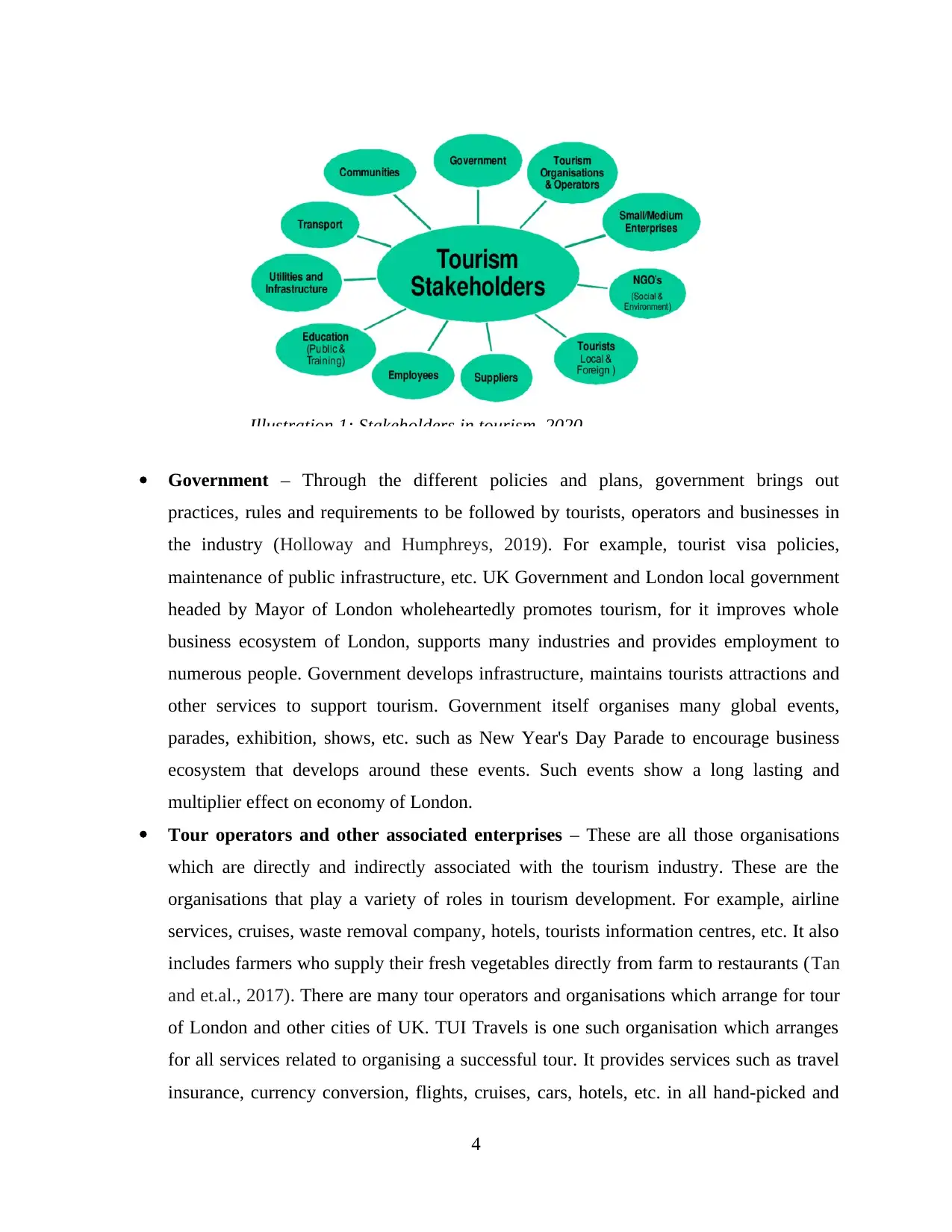
Government – Through the different policies and plans, government brings out
practices, rules and requirements to be followed by tourists, operators and businesses in
the industry (Holloway and Humphreys, 2019). For example, tourist visa policies,
maintenance of public infrastructure, etc. UK Government and London local government
headed by Mayor of London wholeheartedly promotes tourism, for it improves whole
business ecosystem of London, supports many industries and provides employment to
numerous people. Government develops infrastructure, maintains tourists attractions and
other services to support tourism. Government itself organises many global events,
parades, exhibition, shows, etc. such as New Year's Day Parade to encourage business
ecosystem that develops around these events. Such events show a long lasting and
multiplier effect on economy of London.
Tour operators and other associated enterprises – These are all those organisations
which are directly and indirectly associated with the tourism industry. These are the
organisations that play a variety of roles in tourism development. For example, airline
services, cruises, waste removal company, hotels, tourists information centres, etc. It also
includes farmers who supply their fresh vegetables directly from farm to restaurants (Tan
and et.al., 2017). There are many tour operators and organisations which arrange for tour
of London and other cities of UK. TUI Travels is one such organisation which arranges
for all services related to organising a successful tour. It provides services such as travel
insurance, currency conversion, flights, cruises, cars, hotels, etc. in all hand-picked and
4
Illustration 1: Stakeholders in tourism, 2020
practices, rules and requirements to be followed by tourists, operators and businesses in
the industry (Holloway and Humphreys, 2019). For example, tourist visa policies,
maintenance of public infrastructure, etc. UK Government and London local government
headed by Mayor of London wholeheartedly promotes tourism, for it improves whole
business ecosystem of London, supports many industries and provides employment to
numerous people. Government develops infrastructure, maintains tourists attractions and
other services to support tourism. Government itself organises many global events,
parades, exhibition, shows, etc. such as New Year's Day Parade to encourage business
ecosystem that develops around these events. Such events show a long lasting and
multiplier effect on economy of London.
Tour operators and other associated enterprises – These are all those organisations
which are directly and indirectly associated with the tourism industry. These are the
organisations that play a variety of roles in tourism development. For example, airline
services, cruises, waste removal company, hotels, tourists information centres, etc. It also
includes farmers who supply their fresh vegetables directly from farm to restaurants (Tan
and et.al., 2017). There are many tour operators and organisations which arrange for tour
of London and other cities of UK. TUI Travels is one such organisation which arranges
for all services related to organising a successful tour. It provides services such as travel
insurance, currency conversion, flights, cruises, cars, hotels, etc. in all hand-picked and
4
Illustration 1: Stakeholders in tourism, 2020
Paraphrase This Document
Need a fresh take? Get an instant paraphrase of this document with our AI Paraphraser
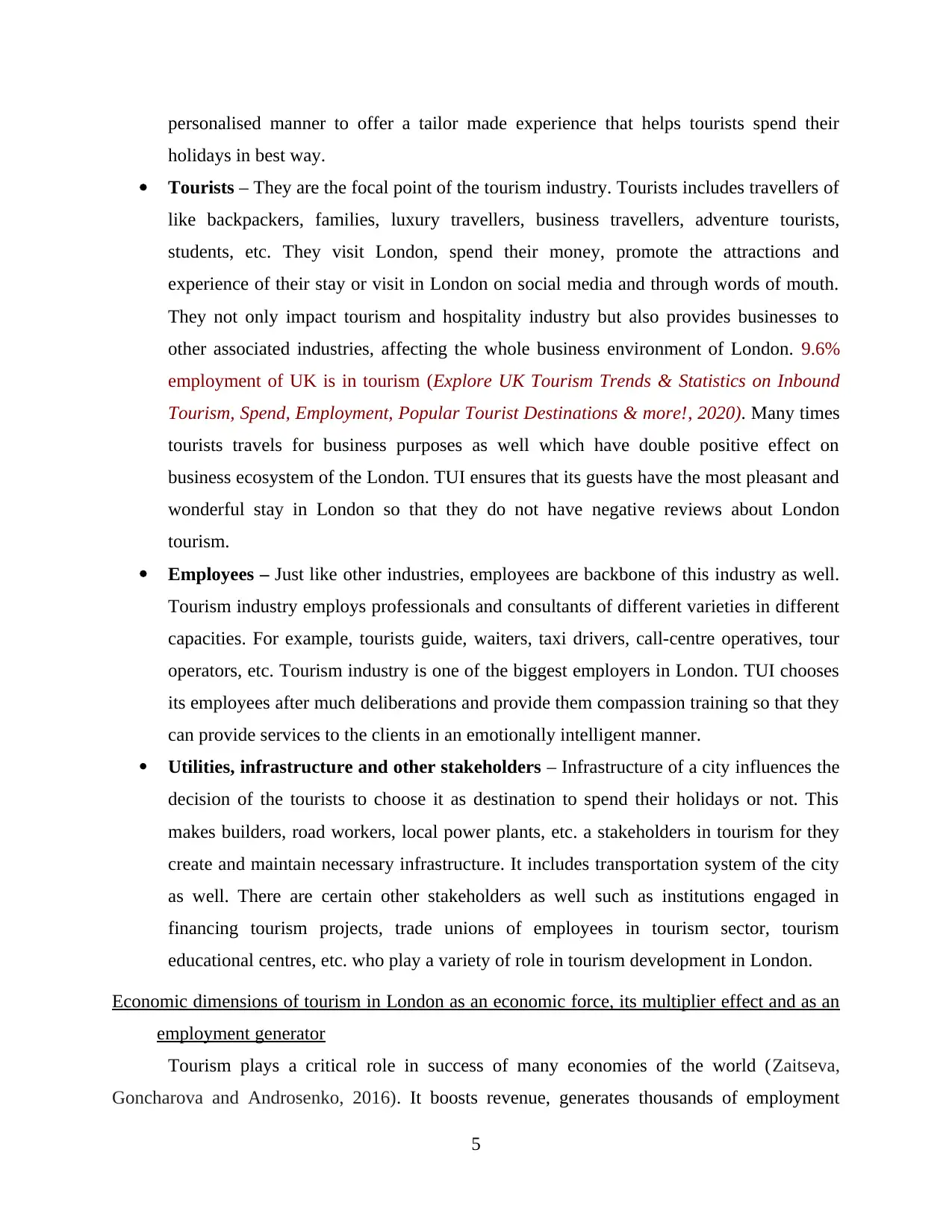
personalised manner to offer a tailor made experience that helps tourists spend their
holidays in best way.
Tourists – They are the focal point of the tourism industry. Tourists includes travellers of
like backpackers, families, luxury travellers, business travellers, adventure tourists,
students, etc. They visit London, spend their money, promote the attractions and
experience of their stay or visit in London on social media and through words of mouth.
They not only impact tourism and hospitality industry but also provides businesses to
other associated industries, affecting the whole business environment of London. 9.6%
employment of UK is in tourism (Explore UK Tourism Trends & Statistics on Inbound
Tourism, Spend, Employment, Popular Tourist Destinations & more!, 2020). Many times
tourists travels for business purposes as well which have double positive effect on
business ecosystem of the London. TUI ensures that its guests have the most pleasant and
wonderful stay in London so that they do not have negative reviews about London
tourism.
Employees – Just like other industries, employees are backbone of this industry as well.
Tourism industry employs professionals and consultants of different varieties in different
capacities. For example, tourists guide, waiters, taxi drivers, call-centre operatives, tour
operators, etc. Tourism industry is one of the biggest employers in London. TUI chooses
its employees after much deliberations and provide them compassion training so that they
can provide services to the clients in an emotionally intelligent manner.
Utilities, infrastructure and other stakeholders – Infrastructure of a city influences the
decision of the tourists to choose it as destination to spend their holidays or not. This
makes builders, road workers, local power plants, etc. a stakeholders in tourism for they
create and maintain necessary infrastructure. It includes transportation system of the city
as well. There are certain other stakeholders as well such as institutions engaged in
financing tourism projects, trade unions of employees in tourism sector, tourism
educational centres, etc. who play a variety of role in tourism development in London.
Economic dimensions of tourism in London as an economic force, its multiplier effect and as an
employment generator
Tourism plays a critical role in success of many economies of the world (Zaitseva,
Goncharova and Androsenko, 2016). It boosts revenue, generates thousands of employment
5
holidays in best way.
Tourists – They are the focal point of the tourism industry. Tourists includes travellers of
like backpackers, families, luxury travellers, business travellers, adventure tourists,
students, etc. They visit London, spend their money, promote the attractions and
experience of their stay or visit in London on social media and through words of mouth.
They not only impact tourism and hospitality industry but also provides businesses to
other associated industries, affecting the whole business environment of London. 9.6%
employment of UK is in tourism (Explore UK Tourism Trends & Statistics on Inbound
Tourism, Spend, Employment, Popular Tourist Destinations & more!, 2020). Many times
tourists travels for business purposes as well which have double positive effect on
business ecosystem of the London. TUI ensures that its guests have the most pleasant and
wonderful stay in London so that they do not have negative reviews about London
tourism.
Employees – Just like other industries, employees are backbone of this industry as well.
Tourism industry employs professionals and consultants of different varieties in different
capacities. For example, tourists guide, waiters, taxi drivers, call-centre operatives, tour
operators, etc. Tourism industry is one of the biggest employers in London. TUI chooses
its employees after much deliberations and provide them compassion training so that they
can provide services to the clients in an emotionally intelligent manner.
Utilities, infrastructure and other stakeholders – Infrastructure of a city influences the
decision of the tourists to choose it as destination to spend their holidays or not. This
makes builders, road workers, local power plants, etc. a stakeholders in tourism for they
create and maintain necessary infrastructure. It includes transportation system of the city
as well. There are certain other stakeholders as well such as institutions engaged in
financing tourism projects, trade unions of employees in tourism sector, tourism
educational centres, etc. who play a variety of role in tourism development in London.
Economic dimensions of tourism in London as an economic force, its multiplier effect and as an
employment generator
Tourism plays a critical role in success of many economies of the world (Zaitseva,
Goncharova and Androsenko, 2016). It boosts revenue, generates thousands of employment
5
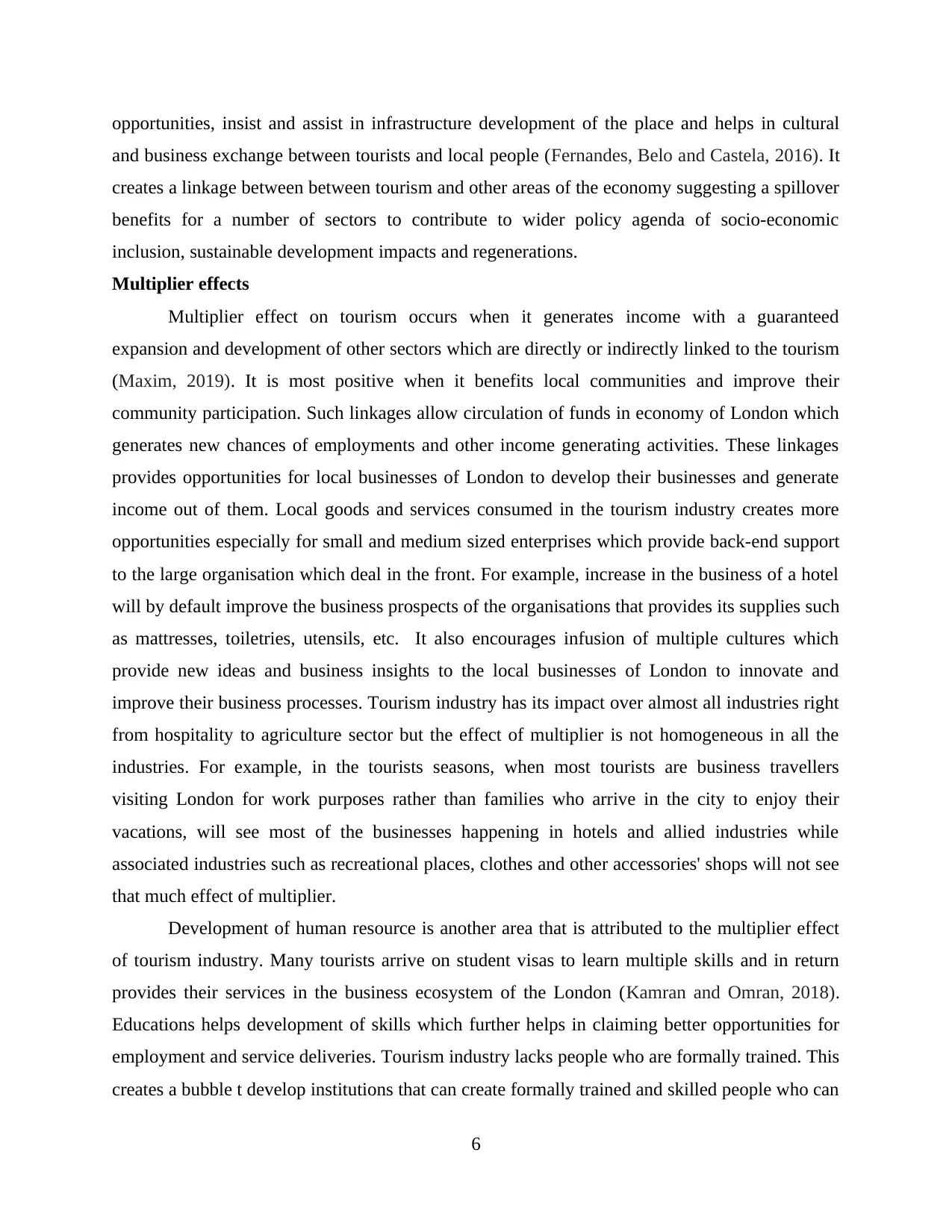
opportunities, insist and assist in infrastructure development of the place and helps in cultural
and business exchange between tourists and local people (Fernandes, Belo and Castela, 2016). It
creates a linkage between between tourism and other areas of the economy suggesting a spillover
benefits for a number of sectors to contribute to wider policy agenda of socio-economic
inclusion, sustainable development impacts and regenerations.
Multiplier effects
Multiplier effect on tourism occurs when it generates income with a guaranteed
expansion and development of other sectors which are directly or indirectly linked to the tourism
(Maxim, 2019). It is most positive when it benefits local communities and improve their
community participation. Such linkages allow circulation of funds in economy of London which
generates new chances of employments and other income generating activities. These linkages
provides opportunities for local businesses of London to develop their businesses and generate
income out of them. Local goods and services consumed in the tourism industry creates more
opportunities especially for small and medium sized enterprises which provide back-end support
to the large organisation which deal in the front. For example, increase in the business of a hotel
will by default improve the business prospects of the organisations that provides its supplies such
as mattresses, toiletries, utensils, etc. It also encourages infusion of multiple cultures which
provide new ideas and business insights to the local businesses of London to innovate and
improve their business processes. Tourism industry has its impact over almost all industries right
from hospitality to agriculture sector but the effect of multiplier is not homogeneous in all the
industries. For example, in the tourists seasons, when most tourists are business travellers
visiting London for work purposes rather than families who arrive in the city to enjoy their
vacations, will see most of the businesses happening in hotels and allied industries while
associated industries such as recreational places, clothes and other accessories' shops will not see
that much effect of multiplier.
Development of human resource is another area that is attributed to the multiplier effect
of tourism industry. Many tourists arrive on student visas to learn multiple skills and in return
provides their services in the business ecosystem of the London (Kamran and Omran, 2018).
Educations helps development of skills which further helps in claiming better opportunities for
employment and service deliveries. Tourism industry lacks people who are formally trained. This
creates a bubble t develop institutions that can create formally trained and skilled people who can
6
and business exchange between tourists and local people (Fernandes, Belo and Castela, 2016). It
creates a linkage between between tourism and other areas of the economy suggesting a spillover
benefits for a number of sectors to contribute to wider policy agenda of socio-economic
inclusion, sustainable development impacts and regenerations.
Multiplier effects
Multiplier effect on tourism occurs when it generates income with a guaranteed
expansion and development of other sectors which are directly or indirectly linked to the tourism
(Maxim, 2019). It is most positive when it benefits local communities and improve their
community participation. Such linkages allow circulation of funds in economy of London which
generates new chances of employments and other income generating activities. These linkages
provides opportunities for local businesses of London to develop their businesses and generate
income out of them. Local goods and services consumed in the tourism industry creates more
opportunities especially for small and medium sized enterprises which provide back-end support
to the large organisation which deal in the front. For example, increase in the business of a hotel
will by default improve the business prospects of the organisations that provides its supplies such
as mattresses, toiletries, utensils, etc. It also encourages infusion of multiple cultures which
provide new ideas and business insights to the local businesses of London to innovate and
improve their business processes. Tourism industry has its impact over almost all industries right
from hospitality to agriculture sector but the effect of multiplier is not homogeneous in all the
industries. For example, in the tourists seasons, when most tourists are business travellers
visiting London for work purposes rather than families who arrive in the city to enjoy their
vacations, will see most of the businesses happening in hotels and allied industries while
associated industries such as recreational places, clothes and other accessories' shops will not see
that much effect of multiplier.
Development of human resource is another area that is attributed to the multiplier effect
of tourism industry. Many tourists arrive on student visas to learn multiple skills and in return
provides their services in the business ecosystem of the London (Kamran and Omran, 2018).
Educations helps development of skills which further helps in claiming better opportunities for
employment and service deliveries. Tourism industry lacks people who are formally trained. This
creates a bubble t develop institutions that can create formally trained and skilled people who can
6
⊘ This is a preview!⊘
Do you want full access?
Subscribe today to unlock all pages.

Trusted by 1+ million students worldwide
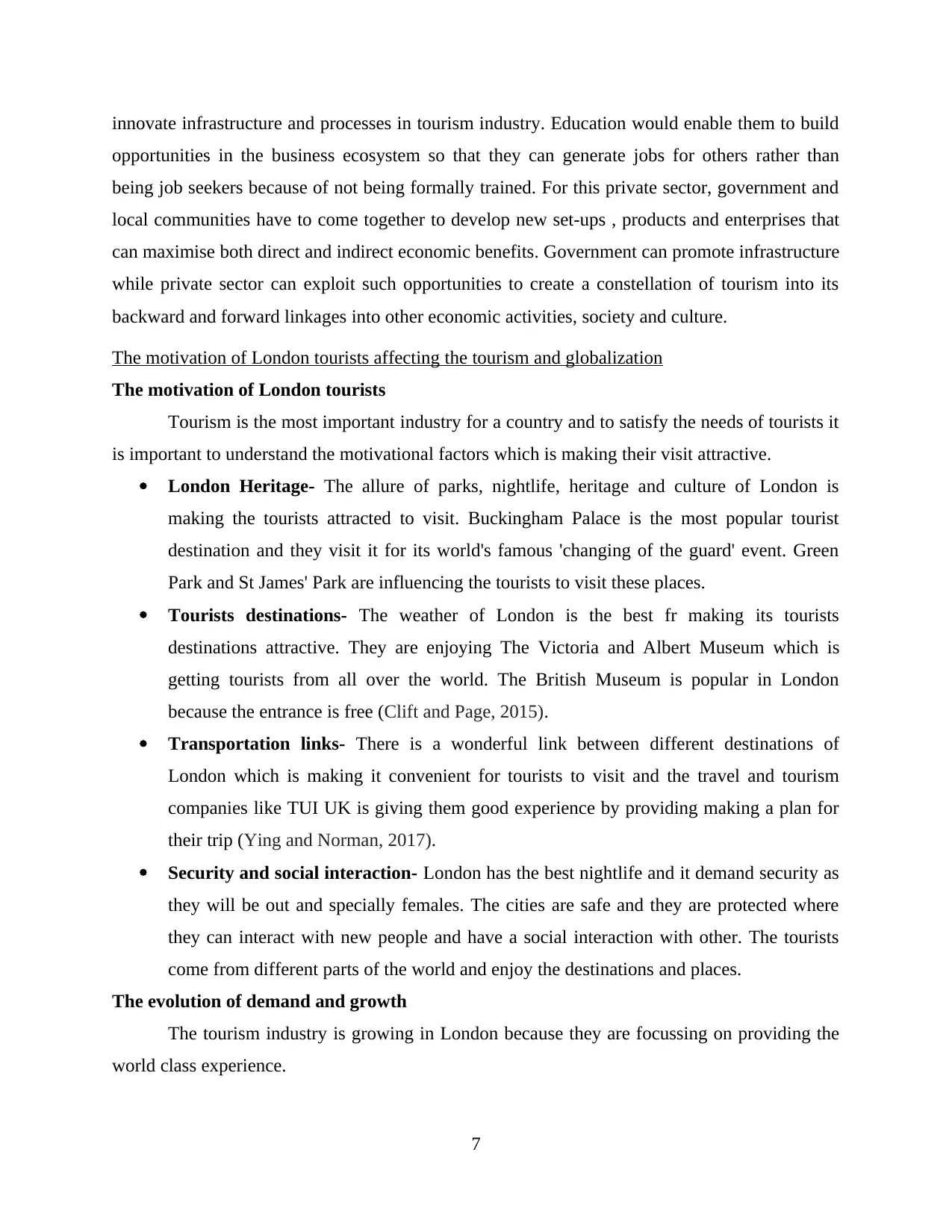
innovate infrastructure and processes in tourism industry. Education would enable them to build
opportunities in the business ecosystem so that they can generate jobs for others rather than
being job seekers because of not being formally trained. For this private sector, government and
local communities have to come together to develop new set-ups , products and enterprises that
can maximise both direct and indirect economic benefits. Government can promote infrastructure
while private sector can exploit such opportunities to create a constellation of tourism into its
backward and forward linkages into other economic activities, society and culture.
The motivation of London tourists affecting the tourism and globalization
The motivation of London tourists
Tourism is the most important industry for a country and to satisfy the needs of tourists it
is important to understand the motivational factors which is making their visit attractive.
London Heritage- The allure of parks, nightlife, heritage and culture of London is
making the tourists attracted to visit. Buckingham Palace is the most popular tourist
destination and they visit it for its world's famous 'changing of the guard' event. Green
Park and St James' Park are influencing the tourists to visit these places.
Tourists destinations- The weather of London is the best fr making its tourists
destinations attractive. They are enjoying The Victoria and Albert Museum which is
getting tourists from all over the world. The British Museum is popular in London
because the entrance is free (Clift and Page, 2015).
Transportation links- There is a wonderful link between different destinations of
London which is making it convenient for tourists to visit and the travel and tourism
companies like TUI UK is giving them good experience by providing making a plan for
their trip (Ying and Norman, 2017).
Security and social interaction- London has the best nightlife and it demand security as
they will be out and specially females. The cities are safe and they are protected where
they can interact with new people and have a social interaction with other. The tourists
come from different parts of the world and enjoy the destinations and places.
The evolution of demand and growth
The tourism industry is growing in London because they are focussing on providing the
world class experience.
7
opportunities in the business ecosystem so that they can generate jobs for others rather than
being job seekers because of not being formally trained. For this private sector, government and
local communities have to come together to develop new set-ups , products and enterprises that
can maximise both direct and indirect economic benefits. Government can promote infrastructure
while private sector can exploit such opportunities to create a constellation of tourism into its
backward and forward linkages into other economic activities, society and culture.
The motivation of London tourists affecting the tourism and globalization
The motivation of London tourists
Tourism is the most important industry for a country and to satisfy the needs of tourists it
is important to understand the motivational factors which is making their visit attractive.
London Heritage- The allure of parks, nightlife, heritage and culture of London is
making the tourists attracted to visit. Buckingham Palace is the most popular tourist
destination and they visit it for its world's famous 'changing of the guard' event. Green
Park and St James' Park are influencing the tourists to visit these places.
Tourists destinations- The weather of London is the best fr making its tourists
destinations attractive. They are enjoying The Victoria and Albert Museum which is
getting tourists from all over the world. The British Museum is popular in London
because the entrance is free (Clift and Page, 2015).
Transportation links- There is a wonderful link between different destinations of
London which is making it convenient for tourists to visit and the travel and tourism
companies like TUI UK is giving them good experience by providing making a plan for
their trip (Ying and Norman, 2017).
Security and social interaction- London has the best nightlife and it demand security as
they will be out and specially females. The cities are safe and they are protected where
they can interact with new people and have a social interaction with other. The tourists
come from different parts of the world and enjoy the destinations and places.
The evolution of demand and growth
The tourism industry is growing in London because they are focussing on providing the
world class experience.
7
Paraphrase This Document
Need a fresh take? Get an instant paraphrase of this document with our AI Paraphraser
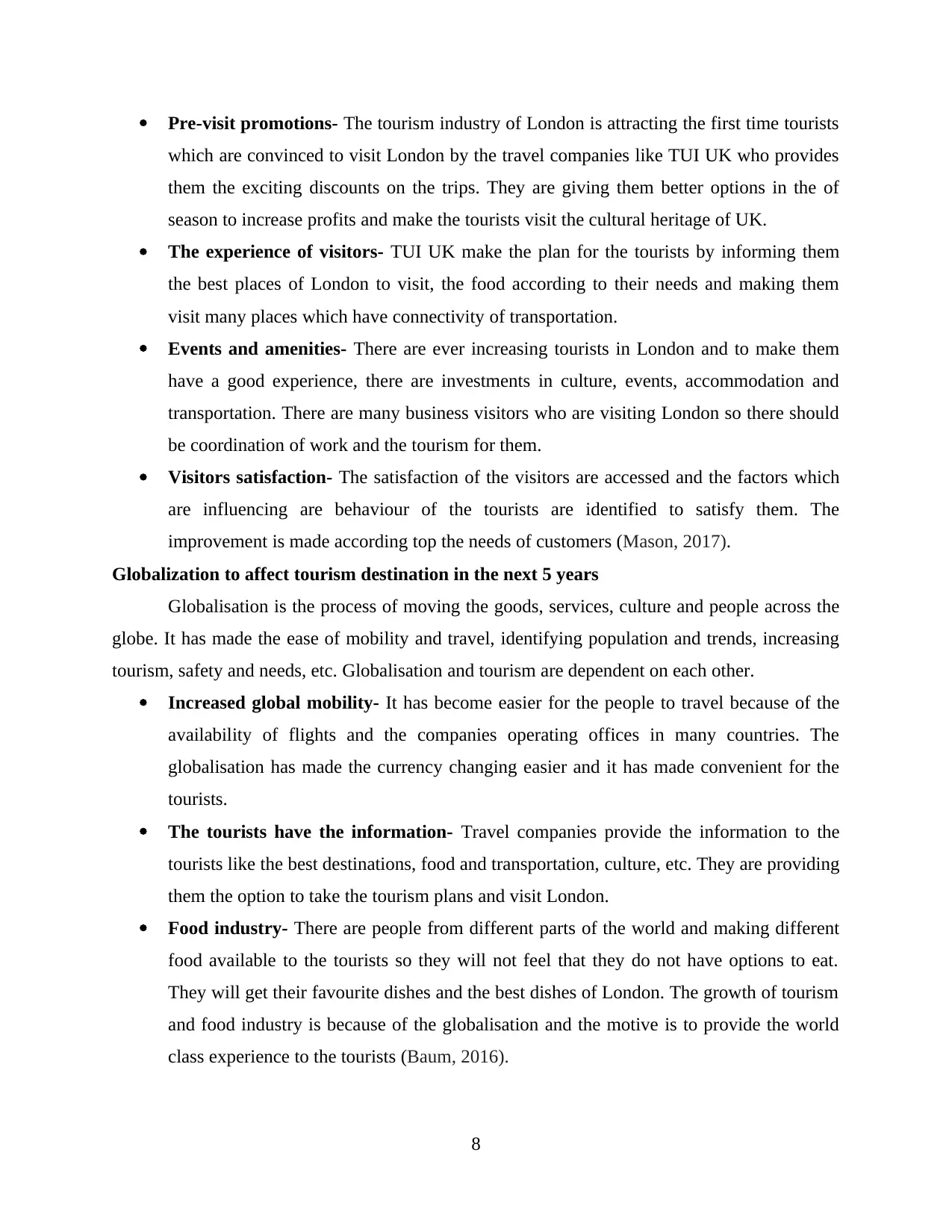
Pre-visit promotions- The tourism industry of London is attracting the first time tourists
which are convinced to visit London by the travel companies like TUI UK who provides
them the exciting discounts on the trips. They are giving them better options in the of
season to increase profits and make the tourists visit the cultural heritage of UK.
The experience of visitors- TUI UK make the plan for the tourists by informing them
the best places of London to visit, the food according to their needs and making them
visit many places which have connectivity of transportation.
Events and amenities- There are ever increasing tourists in London and to make them
have a good experience, there are investments in culture, events, accommodation and
transportation. There are many business visitors who are visiting London so there should
be coordination of work and the tourism for them.
Visitors satisfaction- The satisfaction of the visitors are accessed and the factors which
are influencing are behaviour of the tourists are identified to satisfy them. The
improvement is made according top the needs of customers (Mason, 2017).
Globalization to affect tourism destination in the next 5 years
Globalisation is the process of moving the goods, services, culture and people across the
globe. It has made the ease of mobility and travel, identifying population and trends, increasing
tourism, safety and needs, etc. Globalisation and tourism are dependent on each other.
Increased global mobility- It has become easier for the people to travel because of the
availability of flights and the companies operating offices in many countries. The
globalisation has made the currency changing easier and it has made convenient for the
tourists.
The tourists have the information- Travel companies provide the information to the
tourists like the best destinations, food and transportation, culture, etc. They are providing
them the option to take the tourism plans and visit London.
Food industry- There are people from different parts of the world and making different
food available to the tourists so they will not feel that they do not have options to eat.
They will get their favourite dishes and the best dishes of London. The growth of tourism
and food industry is because of the globalisation and the motive is to provide the world
class experience to the tourists (Baum, 2016).
8
which are convinced to visit London by the travel companies like TUI UK who provides
them the exciting discounts on the trips. They are giving them better options in the of
season to increase profits and make the tourists visit the cultural heritage of UK.
The experience of visitors- TUI UK make the plan for the tourists by informing them
the best places of London to visit, the food according to their needs and making them
visit many places which have connectivity of transportation.
Events and amenities- There are ever increasing tourists in London and to make them
have a good experience, there are investments in culture, events, accommodation and
transportation. There are many business visitors who are visiting London so there should
be coordination of work and the tourism for them.
Visitors satisfaction- The satisfaction of the visitors are accessed and the factors which
are influencing are behaviour of the tourists are identified to satisfy them. The
improvement is made according top the needs of customers (Mason, 2017).
Globalization to affect tourism destination in the next 5 years
Globalisation is the process of moving the goods, services, culture and people across the
globe. It has made the ease of mobility and travel, identifying population and trends, increasing
tourism, safety and needs, etc. Globalisation and tourism are dependent on each other.
Increased global mobility- It has become easier for the people to travel because of the
availability of flights and the companies operating offices in many countries. The
globalisation has made the currency changing easier and it has made convenient for the
tourists.
The tourists have the information- Travel companies provide the information to the
tourists like the best destinations, food and transportation, culture, etc. They are providing
them the option to take the tourism plans and visit London.
Food industry- There are people from different parts of the world and making different
food available to the tourists so they will not feel that they do not have options to eat.
They will get their favourite dishes and the best dishes of London. The growth of tourism
and food industry is because of the globalisation and the motive is to provide the world
class experience to the tourists (Baum, 2016).
8
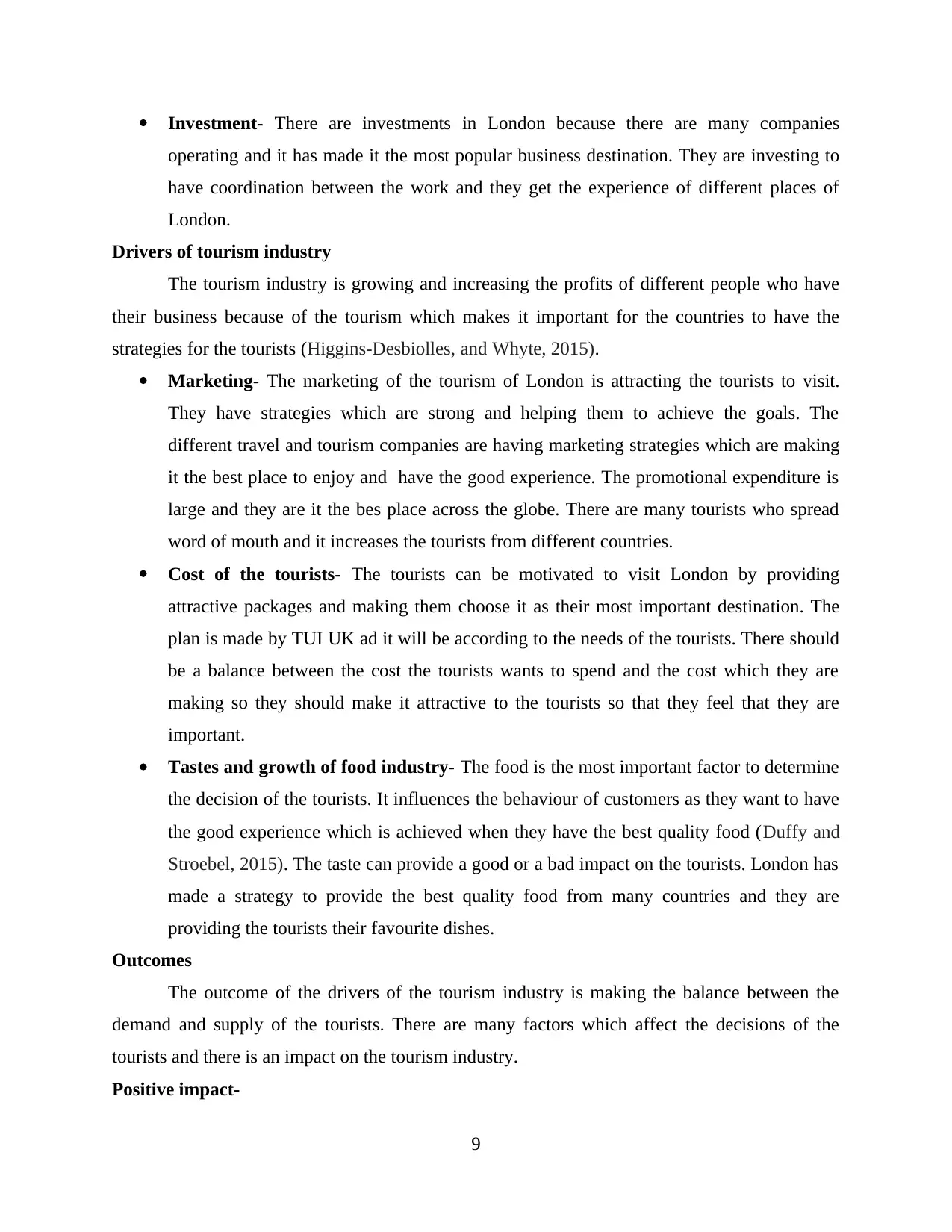
Investment- There are investments in London because there are many companies
operating and it has made it the most popular business destination. They are investing to
have coordination between the work and they get the experience of different places of
London.
Drivers of tourism industry
The tourism industry is growing and increasing the profits of different people who have
their business because of the tourism which makes it important for the countries to have the
strategies for the tourists (Higgins-Desbiolles, and Whyte, 2015).
Marketing- The marketing of the tourism of London is attracting the tourists to visit.
They have strategies which are strong and helping them to achieve the goals. The
different travel and tourism companies are having marketing strategies which are making
it the best place to enjoy and have the good experience. The promotional expenditure is
large and they are it the bes place across the globe. There are many tourists who spread
word of mouth and it increases the tourists from different countries.
Cost of the tourists- The tourists can be motivated to visit London by providing
attractive packages and making them choose it as their most important destination. The
plan is made by TUI UK ad it will be according to the needs of the tourists. There should
be a balance between the cost the tourists wants to spend and the cost which they are
making so they should make it attractive to the tourists so that they feel that they are
important.
Tastes and growth of food industry- The food is the most important factor to determine
the decision of the tourists. It influences the behaviour of customers as they want to have
the good experience which is achieved when they have the best quality food (Duffy and
Stroebel, 2015). The taste can provide a good or a bad impact on the tourists. London has
made a strategy to provide the best quality food from many countries and they are
providing the tourists their favourite dishes.
Outcomes
The outcome of the drivers of the tourism industry is making the balance between the
demand and supply of the tourists. There are many factors which affect the decisions of the
tourists and there is an impact on the tourism industry.
Positive impact-
9
operating and it has made it the most popular business destination. They are investing to
have coordination between the work and they get the experience of different places of
London.
Drivers of tourism industry
The tourism industry is growing and increasing the profits of different people who have
their business because of the tourism which makes it important for the countries to have the
strategies for the tourists (Higgins-Desbiolles, and Whyte, 2015).
Marketing- The marketing of the tourism of London is attracting the tourists to visit.
They have strategies which are strong and helping them to achieve the goals. The
different travel and tourism companies are having marketing strategies which are making
it the best place to enjoy and have the good experience. The promotional expenditure is
large and they are it the bes place across the globe. There are many tourists who spread
word of mouth and it increases the tourists from different countries.
Cost of the tourists- The tourists can be motivated to visit London by providing
attractive packages and making them choose it as their most important destination. The
plan is made by TUI UK ad it will be according to the needs of the tourists. There should
be a balance between the cost the tourists wants to spend and the cost which they are
making so they should make it attractive to the tourists so that they feel that they are
important.
Tastes and growth of food industry- The food is the most important factor to determine
the decision of the tourists. It influences the behaviour of customers as they want to have
the good experience which is achieved when they have the best quality food (Duffy and
Stroebel, 2015). The taste can provide a good or a bad impact on the tourists. London has
made a strategy to provide the best quality food from many countries and they are
providing the tourists their favourite dishes.
Outcomes
The outcome of the drivers of the tourism industry is making the balance between the
demand and supply of the tourists. There are many factors which affect the decisions of the
tourists and there is an impact on the tourism industry.
Positive impact-
9
⊘ This is a preview!⊘
Do you want full access?
Subscribe today to unlock all pages.

Trusted by 1+ million students worldwide
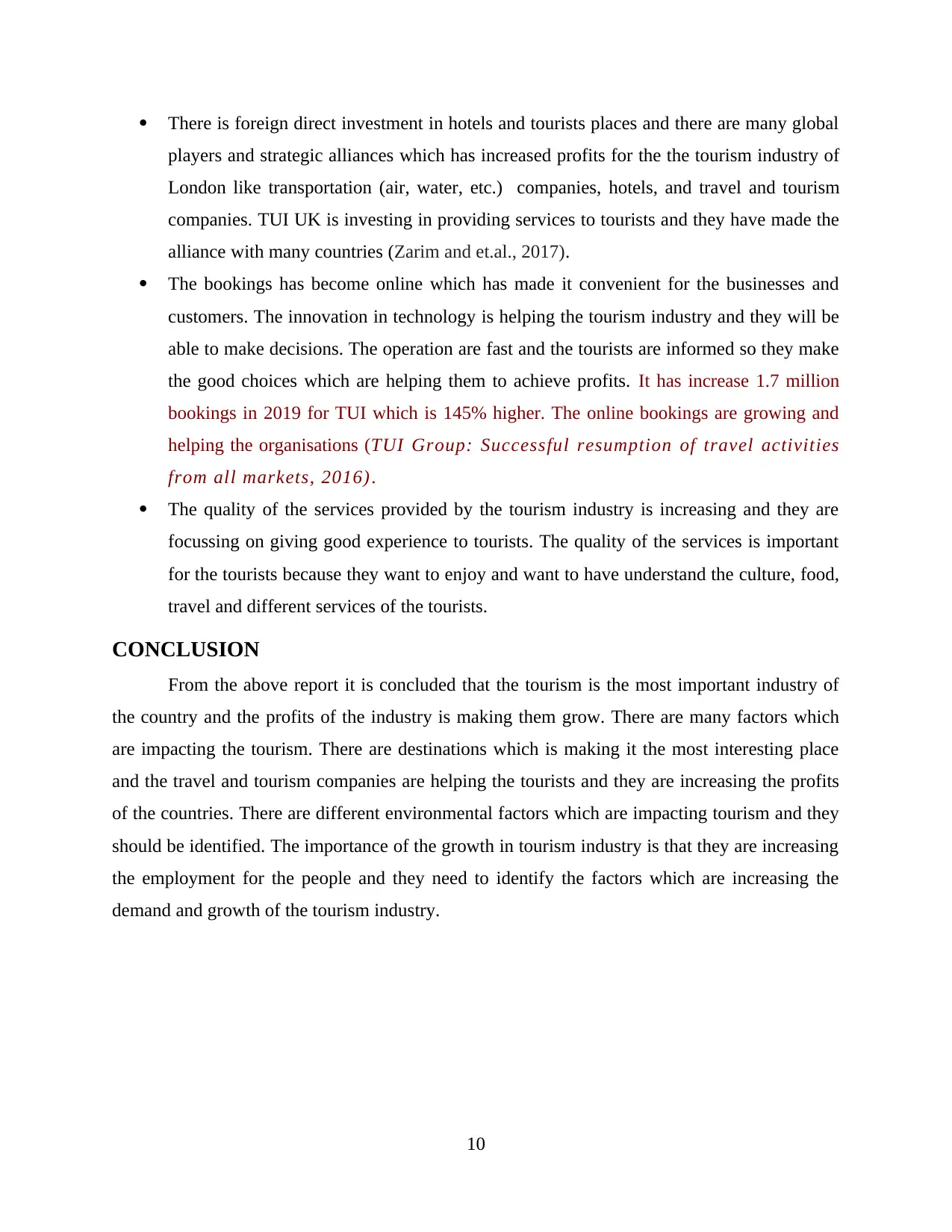
There is foreign direct investment in hotels and tourists places and there are many global
players and strategic alliances which has increased profits for the the tourism industry of
London like transportation (air, water, etc.) companies, hotels, and travel and tourism
companies. TUI UK is investing in providing services to tourists and they have made the
alliance with many countries (Zarim and et.al., 2017).
The bookings has become online which has made it convenient for the businesses and
customers. The innovation in technology is helping the tourism industry and they will be
able to make decisions. The operation are fast and the tourists are informed so they make
the good choices which are helping them to achieve profits. It has increase 1.7 million
bookings in 2019 for TUI which is 145% higher. The online bookings are growing and
helping the organisations (TUI Group: Successful resumption of travel activities
from all markets, 2016).
The quality of the services provided by the tourism industry is increasing and they are
focussing on giving good experience to tourists. The quality of the services is important
for the tourists because they want to enjoy and want to have understand the culture, food,
travel and different services of the tourists.
CONCLUSION
From the above report it is concluded that the tourism is the most important industry of
the country and the profits of the industry is making them grow. There are many factors which
are impacting the tourism. There are destinations which is making it the most interesting place
and the travel and tourism companies are helping the tourists and they are increasing the profits
of the countries. There are different environmental factors which are impacting tourism and they
should be identified. The importance of the growth in tourism industry is that they are increasing
the employment for the people and they need to identify the factors which are increasing the
demand and growth of the tourism industry.
10
players and strategic alliances which has increased profits for the the tourism industry of
London like transportation (air, water, etc.) companies, hotels, and travel and tourism
companies. TUI UK is investing in providing services to tourists and they have made the
alliance with many countries (Zarim and et.al., 2017).
The bookings has become online which has made it convenient for the businesses and
customers. The innovation in technology is helping the tourism industry and they will be
able to make decisions. The operation are fast and the tourists are informed so they make
the good choices which are helping them to achieve profits. It has increase 1.7 million
bookings in 2019 for TUI which is 145% higher. The online bookings are growing and
helping the organisations (TUI Group: Successful resumption of travel activities
from all markets, 2016).
The quality of the services provided by the tourism industry is increasing and they are
focussing on giving good experience to tourists. The quality of the services is important
for the tourists because they want to enjoy and want to have understand the culture, food,
travel and different services of the tourists.
CONCLUSION
From the above report it is concluded that the tourism is the most important industry of
the country and the profits of the industry is making them grow. There are many factors which
are impacting the tourism. There are destinations which is making it the most interesting place
and the travel and tourism companies are helping the tourists and they are increasing the profits
of the countries. There are different environmental factors which are impacting tourism and they
should be identified. The importance of the growth in tourism industry is that they are increasing
the employment for the people and they need to identify the factors which are increasing the
demand and growth of the tourism industry.
10
Paraphrase This Document
Need a fresh take? Get an instant paraphrase of this document with our AI Paraphraser
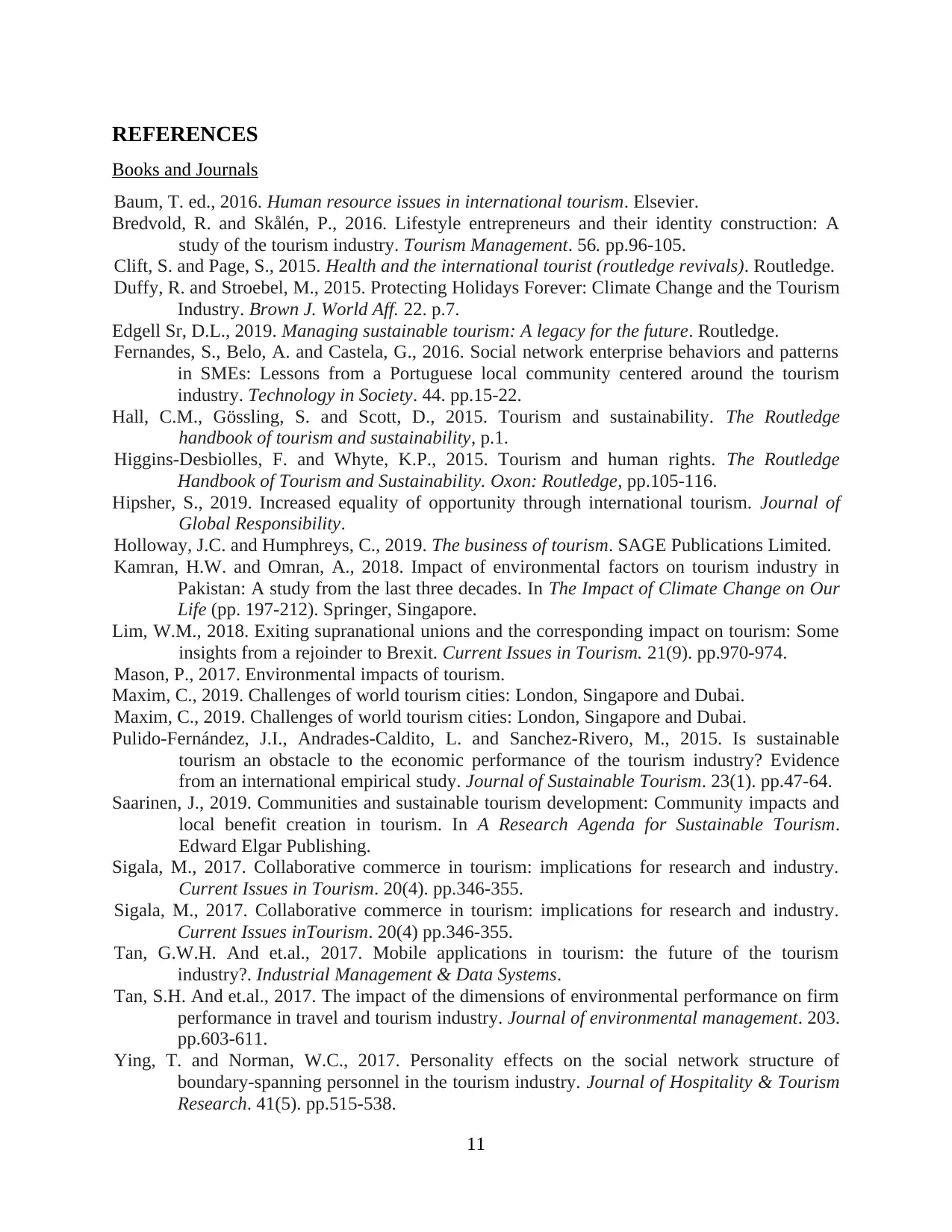
REFERENCES
Books and Journals
Baum, T. ed., 2016. Human resource issues in international tourism. Elsevier.
Bredvold, R. and Skålén, P., 2016. Lifestyle entrepreneurs and their identity construction: A
study of the tourism industry. Tourism Management. 56. pp.96-105.
Clift, S. and Page, S., 2015. Health and the international tourist (routledge revivals). Routledge.
Duffy, R. and Stroebel, M., 2015. Protecting Holidays Forever: Climate Change and the Tourism
Industry. Brown J. World Aff. 22. p.7.
Edgell Sr, D.L., 2019. Managing sustainable tourism: A legacy for the future. Routledge.
Fernandes, S., Belo, A. and Castela, G., 2016. Social network enterprise behaviors and patterns
in SMEs: Lessons from a Portuguese local community centered around the tourism
industry. Technology in Society. 44. pp.15-22.
Hall, C.M., Gössling, S. and Scott, D., 2015. Tourism and sustainability. The Routledge
handbook of tourism and sustainability, p.1.
Higgins-Desbiolles, F. and Whyte, K.P., 2015. Tourism and human rights. The Routledge
Handbook of Tourism and Sustainability. Oxon: Routledge, pp.105-116.
Hipsher, S., 2019. Increased equality of opportunity through international tourism. Journal of
Global Responsibility.
Holloway, J.C. and Humphreys, C., 2019. The business of tourism. SAGE Publications Limited.
Kamran, H.W. and Omran, A., 2018. Impact of environmental factors on tourism industry in
Pakistan: A study from the last three decades. In The Impact of Climate Change on Our
Life (pp. 197-212). Springer, Singapore.
Lim, W.M., 2018. Exiting supranational unions and the corresponding impact on tourism: Some
insights from a rejoinder to Brexit. Current Issues in Tourism. 21(9). pp.970-974.
Mason, P., 2017. Environmental impacts of tourism.
Maxim, C., 2019. Challenges of world tourism cities: London, Singapore and Dubai.
Maxim, C., 2019. Challenges of world tourism cities: London, Singapore and Dubai.
Pulido-Fernández, J.I., Andrades-Caldito, L. and Sanchez-Rivero, M., 2015. Is sustainable
tourism an obstacle to the economic performance of the tourism industry? Evidence
from an international empirical study. Journal of Sustainable Tourism. 23(1). pp.47-64.
Saarinen, J., 2019. Communities and sustainable tourism development: Community impacts and
local benefit creation in tourism. In A Research Agenda for Sustainable Tourism.
Edward Elgar Publishing.
Sigala, M., 2017. Collaborative commerce in tourism: implications for research and industry.
Current Issues in Tourism. 20(4). pp.346-355.
Sigala, M., 2017. Collaborative commerce in tourism: implications for research and industry.
Current Issues inTourism. 20(4) pp.346-355.
Tan, G.W.H. And et.al., 2017. Mobile applications in tourism: the future of the tourism
industry?. Industrial Management & Data Systems.
Tan, S.H. And et.al., 2017. The impact of the dimensions of environmental performance on firm
performance in travel and tourism industry. Journal of environmental management. 203.
pp.603-611.
Ying, T. and Norman, W.C., 2017. Personality effects on the social network structure of
boundary-spanning personnel in the tourism industry. Journal of Hospitality & Tourism
Research. 41(5). pp.515-538.
11
Books and Journals
Baum, T. ed., 2016. Human resource issues in international tourism. Elsevier.
Bredvold, R. and Skålén, P., 2016. Lifestyle entrepreneurs and their identity construction: A
study of the tourism industry. Tourism Management. 56. pp.96-105.
Clift, S. and Page, S., 2015. Health and the international tourist (routledge revivals). Routledge.
Duffy, R. and Stroebel, M., 2015. Protecting Holidays Forever: Climate Change and the Tourism
Industry. Brown J. World Aff. 22. p.7.
Edgell Sr, D.L., 2019. Managing sustainable tourism: A legacy for the future. Routledge.
Fernandes, S., Belo, A. and Castela, G., 2016. Social network enterprise behaviors and patterns
in SMEs: Lessons from a Portuguese local community centered around the tourism
industry. Technology in Society. 44. pp.15-22.
Hall, C.M., Gössling, S. and Scott, D., 2015. Tourism and sustainability. The Routledge
handbook of tourism and sustainability, p.1.
Higgins-Desbiolles, F. and Whyte, K.P., 2015. Tourism and human rights. The Routledge
Handbook of Tourism and Sustainability. Oxon: Routledge, pp.105-116.
Hipsher, S., 2019. Increased equality of opportunity through international tourism. Journal of
Global Responsibility.
Holloway, J.C. and Humphreys, C., 2019. The business of tourism. SAGE Publications Limited.
Kamran, H.W. and Omran, A., 2018. Impact of environmental factors on tourism industry in
Pakistan: A study from the last three decades. In The Impact of Climate Change on Our
Life (pp. 197-212). Springer, Singapore.
Lim, W.M., 2018. Exiting supranational unions and the corresponding impact on tourism: Some
insights from a rejoinder to Brexit. Current Issues in Tourism. 21(9). pp.970-974.
Mason, P., 2017. Environmental impacts of tourism.
Maxim, C., 2019. Challenges of world tourism cities: London, Singapore and Dubai.
Maxim, C., 2019. Challenges of world tourism cities: London, Singapore and Dubai.
Pulido-Fernández, J.I., Andrades-Caldito, L. and Sanchez-Rivero, M., 2015. Is sustainable
tourism an obstacle to the economic performance of the tourism industry? Evidence
from an international empirical study. Journal of Sustainable Tourism. 23(1). pp.47-64.
Saarinen, J., 2019. Communities and sustainable tourism development: Community impacts and
local benefit creation in tourism. In A Research Agenda for Sustainable Tourism.
Edward Elgar Publishing.
Sigala, M., 2017. Collaborative commerce in tourism: implications for research and industry.
Current Issues in Tourism. 20(4). pp.346-355.
Sigala, M., 2017. Collaborative commerce in tourism: implications for research and industry.
Current Issues inTourism. 20(4) pp.346-355.
Tan, G.W.H. And et.al., 2017. Mobile applications in tourism: the future of the tourism
industry?. Industrial Management & Data Systems.
Tan, S.H. And et.al., 2017. The impact of the dimensions of environmental performance on firm
performance in travel and tourism industry. Journal of environmental management. 203.
pp.603-611.
Ying, T. and Norman, W.C., 2017. Personality effects on the social network structure of
boundary-spanning personnel in the tourism industry. Journal of Hospitality & Tourism
Research. 41(5). pp.515-538.
11
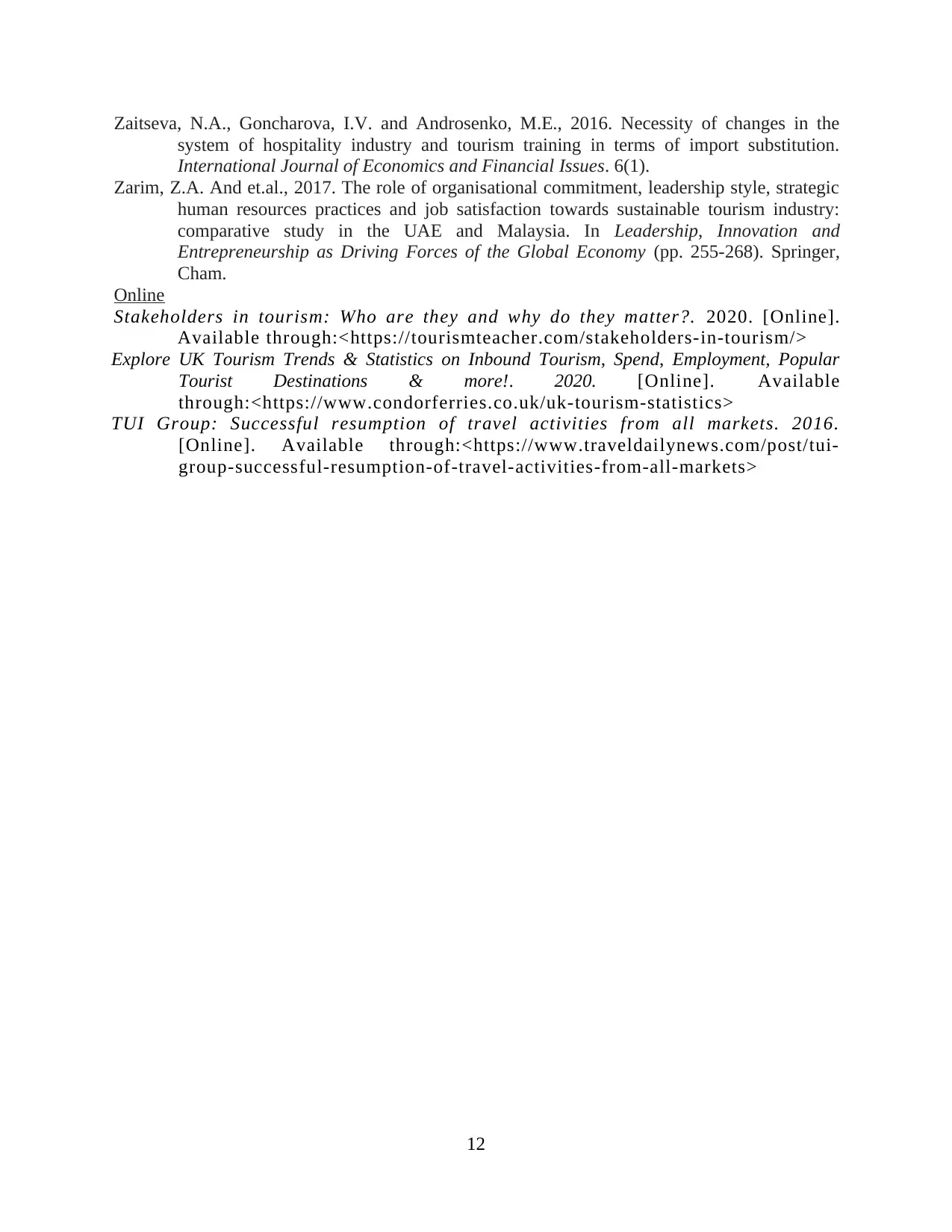
Zaitseva, N.A., Goncharova, I.V. and Androsenko, M.E., 2016. Necessity of changes in the
system of hospitality industry and tourism training in terms of import substitution.
International Journal of Economics and Financial Issues. 6(1).
Zarim, Z.A. And et.al., 2017. The role of organisational commitment, leadership style, strategic
human resources practices and job satisfaction towards sustainable tourism industry:
comparative study in the UAE and Malaysia. In Leadership, Innovation and
Entrepreneurship as Driving Forces of the Global Economy (pp. 255-268). Springer,
Cham.
Online
Stakeholders in tourism: Who are they and why do they matter?. 2020. [Online].
Available through:<https://tourismteacher.com/stakeholders-in-tourism/>
Explore UK Tourism Trends & Statistics on Inbound Tourism, Spend, Employment, Popular
Tourist Destinations & more!. 2020. [Online]. Available
through:<https://www.condorferries.co.uk/uk-tourism-statistics>
TUI Group: Successful resumption of travel activities from all markets. 2016.
[Online]. Available through:<https://www.traveldailynews.com/post/tui-
group-successful-resumption-of-travel-activities-from-all-markets>
12
system of hospitality industry and tourism training in terms of import substitution.
International Journal of Economics and Financial Issues. 6(1).
Zarim, Z.A. And et.al., 2017. The role of organisational commitment, leadership style, strategic
human resources practices and job satisfaction towards sustainable tourism industry:
comparative study in the UAE and Malaysia. In Leadership, Innovation and
Entrepreneurship as Driving Forces of the Global Economy (pp. 255-268). Springer,
Cham.
Online
Stakeholders in tourism: Who are they and why do they matter?. 2020. [Online].
Available through:<https://tourismteacher.com/stakeholders-in-tourism/>
Explore UK Tourism Trends & Statistics on Inbound Tourism, Spend, Employment, Popular
Tourist Destinations & more!. 2020. [Online]. Available
through:<https://www.condorferries.co.uk/uk-tourism-statistics>
TUI Group: Successful resumption of travel activities from all markets. 2016.
[Online]. Available through:<https://www.traveldailynews.com/post/tui-
group-successful-resumption-of-travel-activities-from-all-markets>
12
⊘ This is a preview!⊘
Do you want full access?
Subscribe today to unlock all pages.

Trusted by 1+ million students worldwide
1 out of 12
Related Documents
Your All-in-One AI-Powered Toolkit for Academic Success.
+13062052269
info@desklib.com
Available 24*7 on WhatsApp / Email
![[object Object]](/_next/static/media/star-bottom.7253800d.svg)
Unlock your academic potential
Copyright © 2020–2026 A2Z Services. All Rights Reserved. Developed and managed by ZUCOL.




